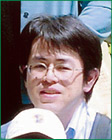Q: Could you explain how you to exploit events in a neuronal birthdate, that is the day when a cell stops dividing, leaves the developmental area, and becomes a primitive neuron, to study brain development?
A: Successive formation of neural cells from progenitor cells occurs during fetal development. Visible in the neocortex, which handles most cognitive function, are six distinct layers of tissue. Early primitive neurons migrate to the inner layers, while late arrivals populate successive outer layers. This indicates that the day a neuron is born will determine its fate. Yet, the precise mechanisms regulating this phenomenon remain unknown.
We developed a way to use an adenoviral vector to introduce genes in a neuronal birthdate specific manner. When injected into a cerebral ventricle at varying times in development, this virus, which is responsible for summer colds in Japan, acts as a transporter for genes introduced into the proliferative zone. Genes introduced at earlier stages of development are introduced into early-born neural cells and into later-born neural cells when injected at later stages. This technique has opened up new research methods, including genetic modification of specific layers of neural cells or the destruction of specific neural cells, that can reveal insights about various brain functions.
If molecular biology defines protocols, then establishing priority for new discoveries favors larger laboratories. A small laboratory needs a battery of unique technologies to successfully clear that hurdle. Our approach is just such a weapon, and that can be broadly applied to give smaller labs a competitive edge in producing novel results and pioneer new paths in research. We intend to use our adenoviral vector technology to compete with other laboratories in the scientific world.
Q: Why did you choose to investigate brain development?
A: As a student I saw a documentary on television about the brain that talked about beautiful star-shaped cells, called astrocytes, in the brain and showed how neurons are illuminated by their activity. There were just like stars in the night sky, which I found more interesting than biology. However, around that time, my undergraduate tutor suggested that I move to another field. Therefore, I switched to biochemistry and studied photosynthesis.
I did not start studying the brain until I started graduate studies. Despite the apparent meandering path to my research career, I am convinced that my experience in biochemistry was an important influence on my research.
Now, molecular biology is enjoying remarkable popularity, and my work is primarily related to issues this field. Nonetheless, its foundations are rooted in biochemistry. As genome engineering continues to develop rapidly, researchers will be challenged to identify the roles and functions of the molecules identified. For this, my experience in biochemistry will be vital.
Q: You have a reputation for being hard on young researchers. Do you feel that there is room for improvement?
A: Yes. Since establishing my own laboratory, I have observed the younger generation of researchers. They are too gentle. To be sure, their English is good, their knowledge base is large, and their understanding more advanced than mine at the same age; however, most of them lack the ability to act by themselves. They prefer to be directed. Why is this so?
One reason for this may stem for an education system that has trained them to answer questions as quickly as possible. Japan's university entrance examination educational system is emblematic of this typical training. IT might explain why they are less skilled at "discovering problems" .
Good research demands independent problem discovery. The true joy research lies in seeing what is not clear, posing questions and finding unique ways to answer those questions independently. While many people believe science has no room for personal feelings, I believe that science is a very private discipline. How one focuses on and addresses a subject is necessarily shaped by the personality and experience of the individual posing the question. I hope younger researchers will realize the difference between pure study and research, learn to challenge the unknown, and pursue the answers with passion.
I am also concerned that younger researchers may feel that there is nothing left to achieve now that large brain research projects, such as genome sequencing, have started and other significant advances have been made. The fact is, current science relies on available technologies or is so narrowly focused by the existing researchers. Younger researchers need to break away from these passive philosophies, and open up new topics for themselves. With time, new fields will be pioneered, one by one.
Q: You also believe that researchers should be "all-round players".
A: Oh yes. They should be actors, able to present important information to their audiences in ways that appeal to them. They should also be authors who are able to competently organize and discuss important elements of their work in their papers. Researchers must wear and juggle many hats, but be warned, once started it is difficult to stop that momentum.
My research unit is still small. I work with just one technician, but we are seeking experienced researchers and young post-docs with some personality to join us in finding ways to exploit our new technology. With the input of these new members, our lab will be able to contribute significant results. Come on; challenge us with your creativity.






